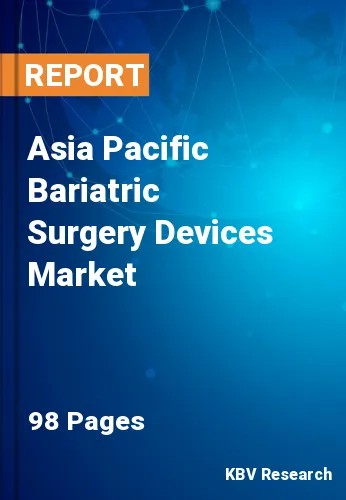The Asia Pacific Bariatric Surgery Devices Market would witness market growth of 5.8% CAGR during the forecast period (2022-2028).
Endoscopic sleeve gastroplasty is one of the newest procedures for weight loss. The endoscopic suturing tool is used in this surgery to reduce the patient's stomach size. This operation is advised when a patient's body mass index is 30 or more and their diet and exercise regimen have not been effective. Endoscopic sleeve gastroplasty allows enables a large loss of weight due to the surgery's restriction of food intake, as well as its reduced invasiveness and low risk of complications. The intragastrical balloon A silicon balloon filled with saline is put into the stomach during this weight loss procedure. Due to the patient's decreased food intake, it aids in weight loss. And even with modest servings, it helps the consumer feel satisfied.
The body's capacity to reach a healthy weight is enhanced by these methods. Each surgical procedure has unique benefits and potential downsides. In order to choose the best operation for the patient, the bariatric surgeon would examine the medical history and consult with the patient. Obesity is linked to a lower quality of life, numerous physical limits, a sense of exhaustion, and physical pain. Many people who have had weight loss surgery say their quality of life has improved as a result of the procedure.
There is a wide prevalence of a number of key medical device manufacturers in the region. According to the National Investment Promotion and Facilitation Agency, in the emerging sector of the Indian economy, the medical equipment market is currently valued at $11 billion in India. Large multinational corporations and small and medium-sized businesses (SMEs) are both present in India's medical device industry, which is expanding at an unprecedented rate. In recent years, the medical devices market has been expanding constantly at a CAGR of 15%. The medical equipment market in India is anticipated to increase significantly in the coming years, reaching $50 billion by 2025.
The China market dominated the Asia Pacific Bariatric Surgery Devices Market by Country in 2021, and would continue to be a dominant market till 2028; thereby, achieving a market value of $195.8 million by 2028. The Japan market is showcasing a CAGR of 5.1% during (2022 - 2028). Additionally, The India market would register a CAGR of 6.4% during (2022 - 2028).
Based on Devices Type, the market is segmented into Minimally Invasive Surgical Devices and Noninvasive Surgical Devices. Based on Minimally Invasive Surgical Devices Type, the market is segmented into Accessories, Suturing Devices, Stapling Devices and Energy/Vessel-sealing Devices. Based on Procedure, the market is segmented into Sleeve Gastrectomy, Noninvasive Bariatric Surgery, Adjustable Gastric Banding, Gastric Bypass, Revision Bariatric Surgery, Mini-gastric Bypass and Biliopancreatic Diversion with Duodenal Switch (BPD/DS). Based on countries, the market is segmented into China, Japan, India, South Korea, Singapore, Malaysia, and Rest of Asia Pacific.
Free Valuable Insights: The Worldwide Bariatric Surgery Devices Market is Projected to reach USD 2.4 Billion by 2028, at a CAGR of 5.3%
The market research report covers the analysis of key stake holders of the market. Key companies profiled in the report include Johnson & Johnson, ReShape Lifesciences, Inc., Apollo Endosurgery, Inc., Medtronic PLC, Olympus Corporation, Intuitive Surgical, Inc., B. Braun Melsungen AG, Spatz FGIA, Inc., Cook Medical, Inc. (Cook Group), and Richard Wolf GmbH.
By Devices Type
By Procedure
By Country
Our team of dedicated experts can provide you with attractive expansion opportunities for your business.

